I have a wonderful opportunity for you. Stay at home, be your own boss, set your own hours and earn over $2 an hour for your work. Ready to sign up?
Why are you making art?
This question came up as I was talking with my assistant Kelley a few weeks ago and raised a few important issues which have driven my art career from its beginning. From drawing with crayons as a two year old until the dawn of my first commercial work, the dominant motivation for making art was because I loved the subject matter I was working with; deeply, compassionately and without question, I drew what I wanted to for myself and for my friends.
Years ago, when a call came from my representative to stop by his office for a briefing on my first book cover commission as a professional, another reason erupted as to why I was an artist. To support myself as an artist. To make money. To be recognized as a professional by peers in the industry. The change was one I embraced enthusiastically, for receiving compensation for my labors validated what I did as an artist, affirming that my chosen career was worthy. My representative, being a very good one, began to book my schedule with commission after commission, making sure that I was creating art full time…and earning money.
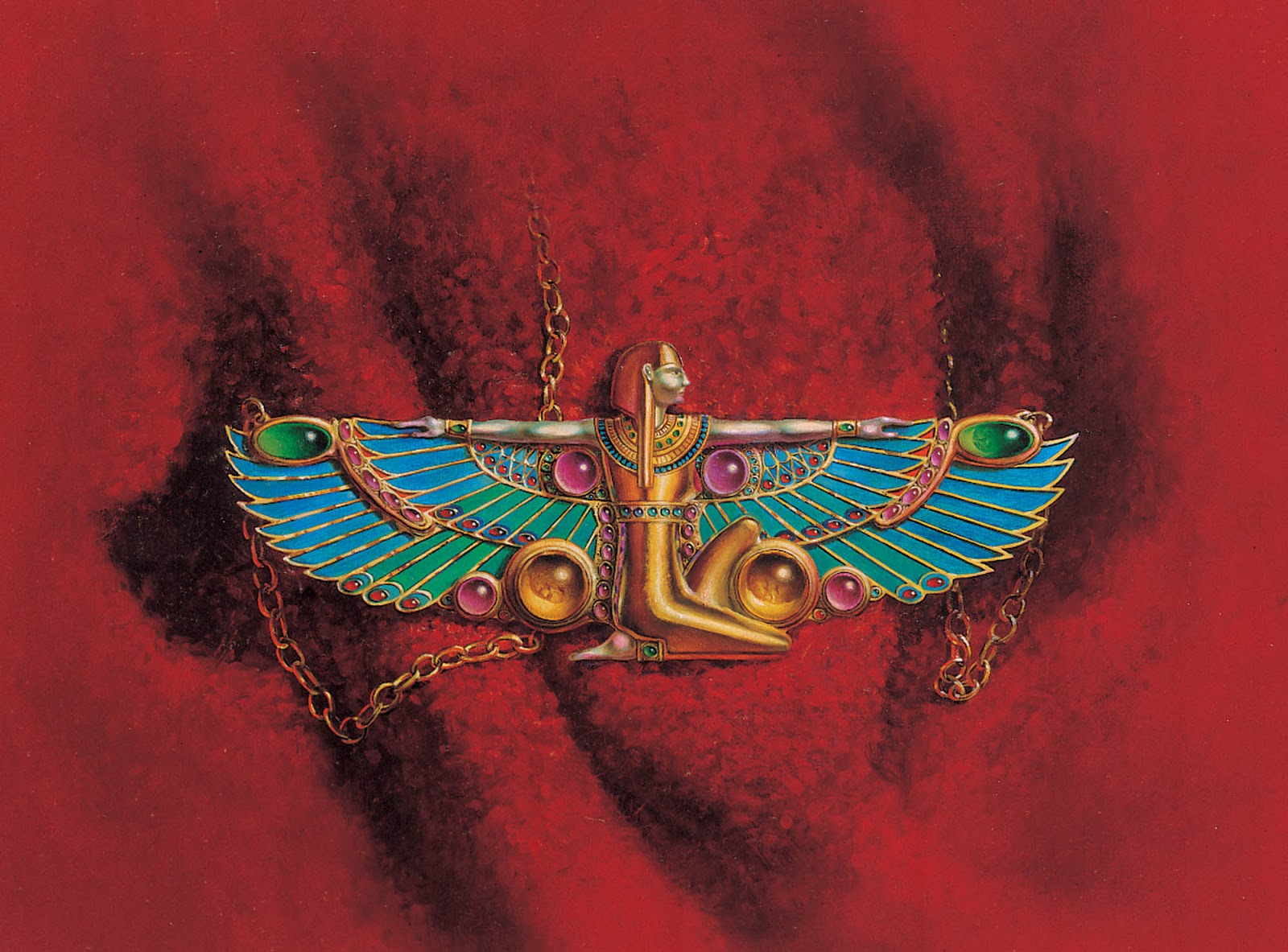 |
| Throne of Isis 1993 ‘A money job’ |
I was lucky to have a representative like Sal Barracca. Early in my first year working with him we sat down and shared a lengthy discussion about where I wanted my career to go. Working with so many artists over the years, Sal knew that each artist brings different motivations to their work, some do it for love, for money, for fame and for something else. I had just completed a few images for Sal which were truly ‘show me the money!’ illustrations, and although I enjoyed the work, I found much greater satisfaction out of paintings created for narrative science fiction and fantasy novel covers. Sal wanted to check with me and see what type of route I wanted to pursue as a professional artist, to make money regardless of content, or to nurture my love of painting at the cost of losing some business.
Under his guidance and wisdom I decided to set a course and make a career and name within the genre of science fiction and fantasy. Over the following years, Sal directed work to me which followed these goals. I was lucky to be able to develop a portfolio around work which I had a passion for and not need to accept commissions purely for their monetary value.
But doing work for love can have its downsides, as anyone who has worked in magazines, comics, and the gaming industry can tell you. There is plenty of commissions which do not pay much and may never lead to a prosperous, let alone livable, lifestyle. Below I share with you one of my worst paying jobs ever for a game card. But the horrible pay really was not the fault of my client, but rather how much time I decided to spend on the work.
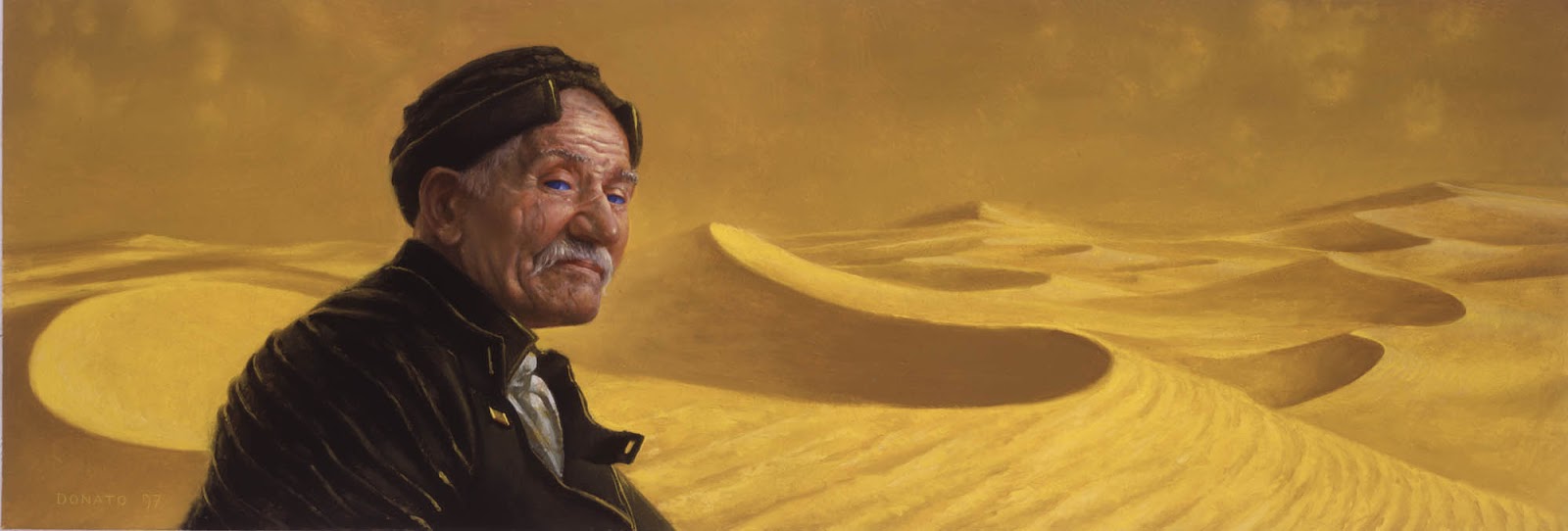 |
| Esmar Tuek Dune Collectable Card Game Unicorn Games 1997 |
Fee: $100
Expenses:
$45 Transparency for reproduction (I was so happy with the results I decided to document the painting properly)
$10 Mounting and Supply costs
$15 Shipping
Profit: $30
Earnings: $30 for 15 hours of work = $2 an hour!
What was I doing creating work at $2 an hour, earning less than what I made as a teenage paperboy? Was this the career I set out to have as an artist?
The answer: there is more to creating art for love and money. There is creating art for fame – for a career – and this portrait for Unicorn Games was a step I was taking in that plan to build a life long career out of my art. My discussions with Sal and assessments of what I saw and understood of other artists, led me to the conclusion that the most successful artists were those that made a career of their work. They found a voice, a subject, or an approach to nurtured and develop as a unique way of seeing and interpreting the world through their art.
This painting of Esmar Tuek was more than adding another image to my portfolio, it was a chance to show how I could tackle science fiction content in a manner which spoke to my love of classical figuration. I was looking for ways to break outside of the norms of the genre and bring a new voice to interpreting the content of my commercial assignments. Portraiture was one area I loved and this commission provided the opportunity to explore and experiment in this new direction.
Obviously my career was not made overnight, nor was it based upon executing many commissions at $2 an hour. The majority of what I have undertaken has been for money, a few for love and the rare image for my career. Sometimes two of these factors meet together on an assignment, and when the stars align, all three make for a fully pleasurable experience.
As I spoke about these issues with Kelley, it made me reflect upon how important motivational aspects have been to my career. It is with 20/20 hindsight that all of these choices appear to be the right ones, but I cannot deny that some images that retain their staying power were inspired by these factors. My first assignment for Penguin Books speaks to the desire to impress a first time client and help launched my career with them. It was successful and Construct of Time remains a cornerstone in my portfolio twenty years later. I didn’t earn $2 an hour creating it, but it wasn’t about the money anyway, it was about my career.
The next time you tackle a commission, assignment or generate a sample piece of art think about why you are making that piece and how it fits into your grand scheme to become, grow and mature as an artist. It will help you resolve issues and allow you to believe in yourself and the direction you want to take your career.
Good Luck!
| Construct of Time 1993 Donato Giancola 18″ x 27″ Oil on Panel |


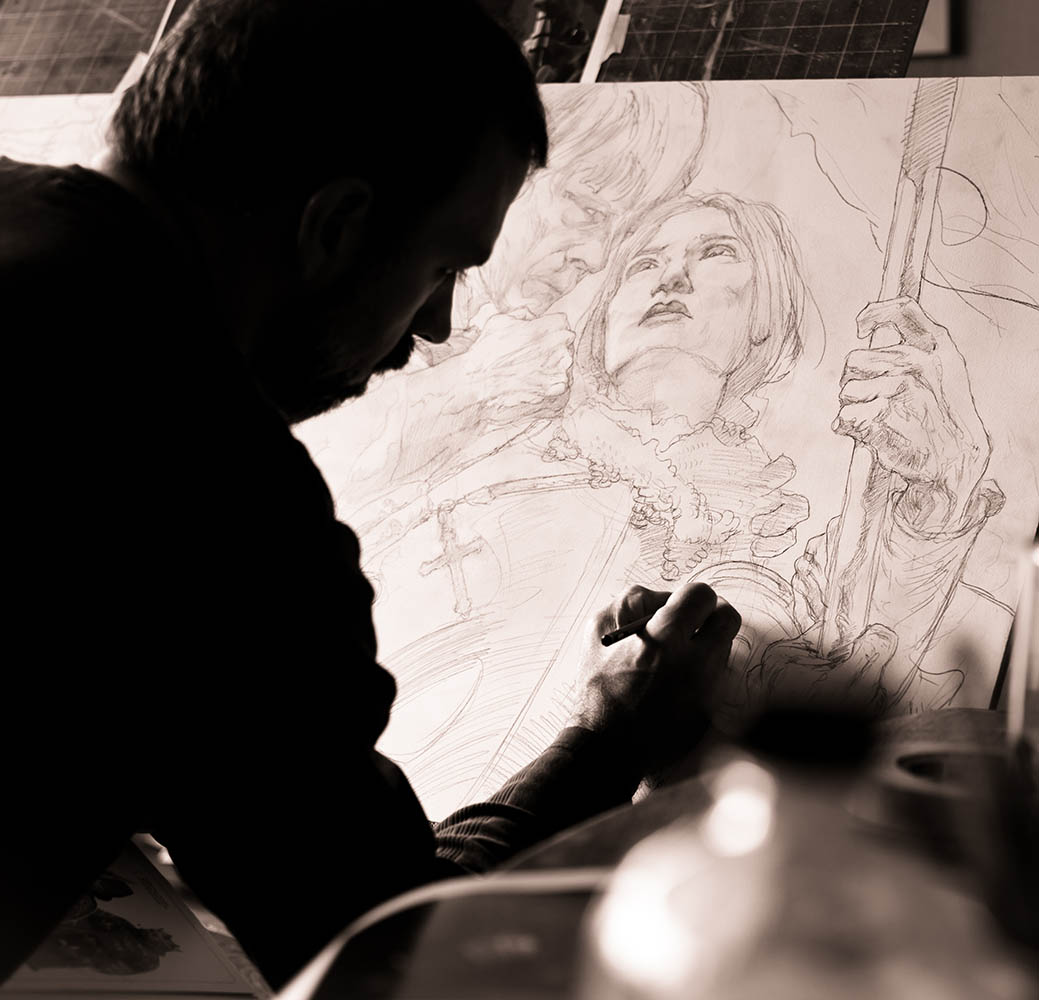


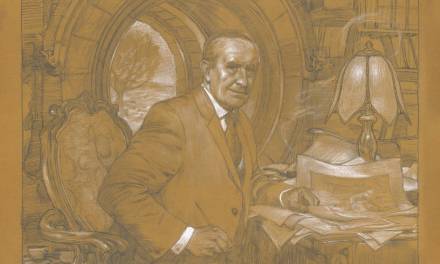

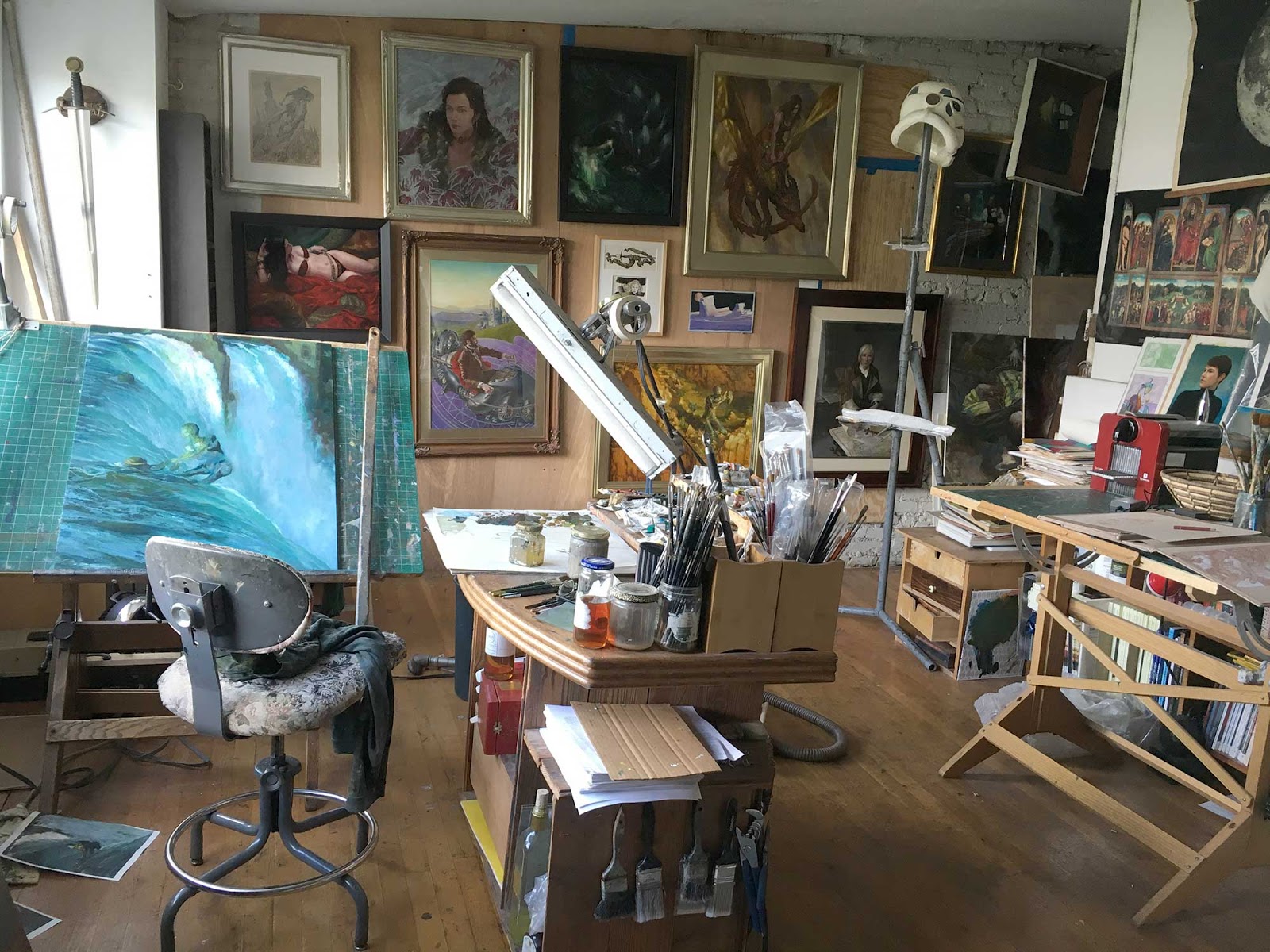
Great post!!
Your intentions definitely comes through with those images.
Just 15 hours on “Esmar Tuek” blows me away.
thank's for this post! It's an interesting food for toughts: i'm approaching to this career and i'm so concentrate on doing better “art”(i feel it's a word to big for me)that sometimes is useful to stop and think at what i'm doing, why i'm doing it, where i want this to lead me and how to make it happened.
thank's for sharing!
Great post, beautiful work!
– Jeff
Thanks for this post it came at just the right time.
-Bill
Dan, I would gladly pay you * $2.50 * an hour to do art for me! Gimme a call and we'll get the ball rolling. 🙂
Great post Donato. I've often struggled with my brain over accepting commissions that i thought were too low on the money side. I guess if it gets me where i want to be, i should just suck it up and do the damn work!
I appreciate the way you impart advice because I feel like you're one of the more relatable professional & successful artists whose posts I've read. While I try to read and absorb all kinds of advice, I feel like yours is the most genuinely empathetic to the amateur, and oftentimes conflicted, young artist.
I monitored your SmARTclass last night, and found that I really enjoyed hearing you talk about your early convention experiences–people rarely talk about how incredibly awkward and challenging it can feel for a new artist to pave a way for themselves in the industry (which, when starting out feels both unfamiliar and overwhelming) But now I feel better knowing these private challenges are a natural part of every professional artists' journey.
So thanks very much for that 🙂
It's actually nice to hear someone find at least some positive in sometimes not getting paid what you should be paid. I've recently agreed to do a pretty terribly paid job, but the client has an IP I'd love to do work for. Sometimes it's not always about pay, but about opportunity too. I've found when I don't stress over super high pay all the time it sometimes opens doors I wouldn't have found otherwise.
I do envy you your representative, though, sometimes it's having just one good contact that makes the difference!
Thank you for the comments everyone. There is much to discuss under this topic of career development and undertaking commissions for extremely low pay. One area I did not touch upon is speculative assignments, or taking payment as a form of 'exposure'. There are plenty of people and business out there that will exploit fresh, new talent (and desperate seasoned pros!). It is your job to assess each opportunity and leverage the most out of it for your career. Only then will you never be taken advantage of.
Donato
Thank you for posting this! I've been struggling with some low paying high stress commissions for the past week. This blog entry really put things into perspective, and I feel like a giant weight has been lifted off of my shoulders.
Wow!!! This defiantly had me stop an think!
I will need to spread this out to friends and some of your future fans!
This def hooked me!
Thank you!!
New Aston Martin Rapid, 2013 Hyandai Veloster Turbo Mazda Takeri Concept and Top Companies of Most popular Cars and Vehicles. Total Concept Cars in the World, Latest Strange Vehicles in the World, All Concept Cars and Strange Vehicles Hot pictures and info
worldlatestvehicles.com
It's great to see an artists of your status post something like this. It is about career. Sometimes to move that career forward, you end up working for $2 an hour. It's gets old always hearing how working for low fairs, is killing everyone else in the industry.
No one likes to be underpaid. But clearly sometimes payment isn't just a dollar amount.
So if you were to do it again, how much would you charge for the same painting today?
It's really disheartening to see work that far dwarf's my entire life's work and knowing that it only earned $2 an hour.
Hello Charles,
I cannot say what I would charge per hour now, as this piece is all about the moment and time when it was created. Thus there really is no direct comparison. The motivations and the drive that made we want to work for almost free have changed.
I will say that I still create art on a speculative nature when I am producing for a gallery show or exhibition or art book. It is not totally speculative, as now I create original works with the future intent to sell the art. But not every single piece sells, thus it is in some way done for free in the service of my career…
Nice your post……….. Free skin solution and health solution please visit this blog
http://www.guide-world.blogspot.in
I find it horrific that you were on the hook for the shipping costs…I am currently working on a commission that is also taking too long for the money, but it's his budget, and not his fault I'm taking the time to really polish it up 🙂
you are very talented nevertheless